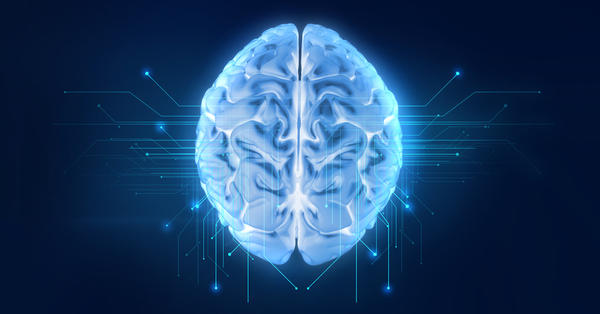Ryan Brennan, DO, a Froedtert & MCW neurologist and movement disorder specialist, sees his patients’ symptoms resolve before his eyes — one moment their hands are shaking, and the next, their tremors are gone. The treatment leading to these results is called Deep Brain Stimulation, or DBS. DBS is an advanced procedure for people with movement disorders like Parkinson’s disease, essential tremor, dystonia and epilepsy.
“DBS can lead to a massive change in quality of life,” Dr. Brennan said. “Patients whose tremors prevented them from eating, drinking or writing without help are able to resume these activities and more.”
DBS uses a battery-operated device, much like a pacemaker, to deliver precise, personalized and adjustable electric current through electrodes implanted deep within the brain.
“The electrodes jam the abnormal signals that are causing the patient’s symptoms,” Dr. Brennan said.
During the procedure, Dr. Brennan uses computerized brain-mapping technology to monitor the patient’s brain activity and target areas where the neurons are firing abnormally. The neurosurgeon uses this information to implant the electrodes while the patient is awake to ensure accuracy.
“There are no pain receptors in the brain, so patients don’t feel anything during the procedure,” Dr. Brennan said. “But they are able to experience their symptoms subside.”
The stimulator device is implanted in the chest during a separate procedure and connected to the electrodes with a wire.
“All of this is underneath the skin,” Dr. Brennan said. “You can shower or swim and you wouldn’t know it is there.”
Parkinson’s disease patients may experience relief from symptoms such as rigidity, tremors and walking difficulties. Dystonia patients benefit from a reduction of involuntary muscle contractions, and shaking subsides for patients with essential tremor. People with epilepsy who undergo DBS may have fewer seizures.
“Each condition requires us to target a different part of the brain,” Dr. Brennan said. “Patients with essential tremor experience at least a 50 percent reduction in their symptoms, and, in many cases, there is an 80 to 100 percent reduction in their tremors. Patients with Parkinson’s disease experience significant reduction of tremors and rigidity and are able to reduce medications.”
DBS was first developed for people with tremor. The standard surgical treatments for tremor in the 1990s were a pallidotomy or thalamotomy, which used a heated electrical probe to destroy a small area of brain cells. DBS is much more controlled and allows for the stimulation to be programmed, adjusted (or even turned off) and reduces risks of complications.
DBS is appropriate when medication is no longer effective in controlling a person’s symptoms, but it is a treatment not a cure. The exact mechanisms of how DBS improves symptoms are still not known. There are more than 400 clinical trials registered with the National Institutes of Health to learn more about why DBS is successful.
“There is a lot of research being done to better understand Deep Brain Stimulation and the conditions it can treat,” Dr. Brennan said. “From movement disorders to dementia, obsessive compulsive disorder and eating disorders, there are many possibilities.”

I have been very frustrated about getting information from the staff in the neurology dept. at Froedert regarding Deep Brain Stimulation. I understand that you have been implanting the MEDTRONIC device for many years. I am interested in merely finding out if and when you will be using the newer technology that came out 2 yrs ago, namely the BOSTON SCIENTIFIC and ABBOTT. Hospitals all over the country are using these new devices. I am wondering why Wisconsin is lagging so far behind. RUSH, CLEVELAND, MINNESOTA, MICHIGAN, and other teaching hospitals are implanting these new DBS devices. I was unable to get past the secretary who I asked to let me talk to a nurse or AA for a yes or no answer. She told me that I had to make an appt. with a neuro to get the answer. FYI - I have been approved to have the surgery but find it very frustrating that I have to travel to another state to get it done along with the followups . Would you please have an informed person call me to get a few questions answered.
Hi karen bate – Thank you for reaching out. We’re sorry to hear about your frustrations. I have shared your contact information and this comment with our Neurosciences team, and someone will contact you. Thanks.